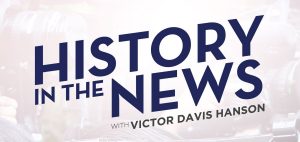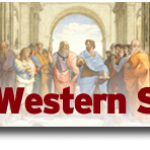History in the News: Freedom Academy Video Series
History in the News
Journalists like to think that they’re writing the first rough draft of history, but in fact, their stories often just recycle forgotten plotlines from long-ago conflicts. In this eight-part series, Victor Davis Hanson shows how today’s headlines tend to reflect yesterday’s news, whether they concern Germany’s resurgence or America’s cultural influence or the challenge of fighting an enemy who does not play by the
rules. Confucius had it right: To learn about the future, study the past.
The full playlist is here:
Or you can select individual videos below
1) The Long War, 1870 – 2012: Why Germany Finally Won Europe
As the European Union looks to Germany to bail out its insolvent members, a question arises: Is the German Problem back again? From Roman times through the 20th century, Europeans confronted the recurring challenge of how to contain German dynamism. This proved impossible in 1914 and 1939. The problem disappeared during the Cold War, when Germany was divided. Now, with the USSR defunct, Germany reunited, the EU crumbling and NATO nearly senile, Germany seems more unrestrained than ever.
2) The 21st American Century Or What an Amazon or Facebook Says About
America
Some people insist that America’s global influence is on the wane. Yet billions of people around the world will log onto Facebook today, or do a search on Google, or order something from Amazon. These brands are the Levis and Coca-Cola of the current generation – expressions of American popular culture that have enormous global appeal. And our popular culture is a reflection of a unique Constitution that promotes freedom and merit. Add to that the further advantage of our great natural wealth, and it is hard to credit all those gloomy predictions about America’s inevitable decline.
3) Lessons from California: Back to Reagan or Onward to Greece?
People used to write hit songs about the wonder that was California. Not any more. How did a state with so much inherited and natural wealth manage to squander its advantages? Do the math: California has some of the highest taxes in the nation, yet it also has the worst services, public infrastructure and schools. By over-regulating its businesses, putting it natural resources off limits, allowing unions to control its schools and public employees, and letting in millions of illegal aliens, Californians have nearly impoverished their once-wealthy state.
4) What Was the University, And Why Did It Become Illiberal and Unsustainable?
Astronomical costs, partisan politics and the inability to graduate literate students all characterize the modern university. The solution will require a redefinition of higher education and the end of college as we know it.
5) How To Check Western Military Advantage: From 9/11 to Afghanistan and
Iraq
For some 2,500 years, Western militaries have enjoyed innate advantages over their rivals. But on occasion, non-Westerners have obtained Western weapons, encouraged anti-war movements among Western populaces, turned Western nations against one another, and used the law of asymmetry to make a Western victory difficult. So, while the West still reigns supreme on the conventional battlefield, it does not always win its wars.
6) Why Do Millions Emigrate To Rather Than From the West? From Ancient
Greece to Modern America
When people vote with their feet, they vote for the West. It’s been true for centuries, and it remains true today: Non-Westerners emigrate to Western societies in vast numbers seeking personal freedom and a better life. But when people immigrate here illegally, and then resist assimilation after they arrive, they undermine the rationale that drew them here in the first place.
7) Is Barack Obama the Ultimate Fruition of Modern American Liberalism?
Presenting the postmodern presidency. Barack Obama’s election has allowed the American people to experience firsthand what heretofore had been ideas and theories largely confined to the university – postmodern reasoning, moral equivalence, radical egalitarianism, multiculturalism and utopian pacifism.
8)Reaganism: Its Myths and Realities
The mythology surrounding Ronald Reagan and his presidency obscures the reality that he was neither a die-hard conservative nor a dangerous reactionary, but a gifted traditionalist whose pragmatism, communications skills and mastery of compromise allowed him to achieve what was possible rather than dream about what was not..





